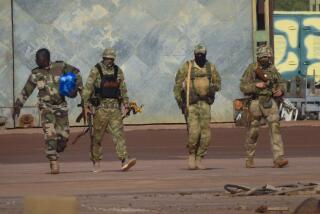China Cracking Down in Muslim Region, Group Says
- Share via
FENGLOU, China — Under cover of the war on terrorism, the Chinese government has significantly stepped up its crackdown against alleged separatists in the western region of Xinjiang since Sept. 11, a human rights group charges.
Authorities have shut down mosques, detained thousands of people deemed suspected separatists and clamped tighter controls on the local media to discourage unrest among the indigenous Uighur population, according to a report released today by Amnesty International.
The Uighurs are a Turkic-speaking, mostly Muslim people, many of whom chafe under Chinese rule and some of whom advocate independence. For years, the Beijing regime has tried to crush separatist sentiment in the region, a vast, sparsely populated area rich in natural resources and closer in culture and heritage to Central Asian nations such as Uzbekistan.
Since the Sept. 11 terrorist attacks, the Chinese government has sought to link its campaign in Xinjiang to the worldwide war on terrorism. Two months ago, Beijing issued a report purporting to show direct ties between Uighur separatists and Osama bin Laden, who it says promised the separatists a “fabulous sum” of money for their operations.
A State Department report on human rights this month criticized China’s campaign to smash separatism in Xinjiang. The Bush administration has refused to recognize a connection between the crackdown and the global war on terrorism, prompting accusations of a double standard from Beijing.
The Chinese government’s report said that authorities were targeting only “a few core members and criminals,” Muslim militants accused of plotting bombing, arson and poisoning incidents responsible for the deaths of 162 people between 1990 and 2001.
But Amnesty International alleges that a much broader crackdown is being carried out.
Armed police have been mobilized across Xinjiang to beef up patrols of cities and surveillance of entry points into the region, resulting in the detention of several thousand people, the report says. In the regional capital, Urumqi, alone, at least 166 “violent terrorists” and “other criminals” were arrested between Sept. 20 and Nov. 30, the report says, citing accounts in the official Chinese media.
The crackdown has also extended into the religious sphere, despite China’s nominal guarantee of freedom of religion in its constitution, Amnesty International says.
Dozens of Muslim clerics and students have been detained, and mosques accused of being hives of separatist thought and activity have been closed down, the report alleges. Fasting was disallowed in some schools and government offices during the holy month of Ramadan, the report says.
Censors have stepped up monitoring of the Internet, and officials are cracking down on literature and media, Amnesty International says.
Of particular concern, the report says, are the summary trials of detainees that have led to scores of people being sentenced to prison and in some cases executed, often on the basis of expanded but vague anti-terrorist laws.
Just two weeks after the Sept. 11 attacks, 48 Uighurs were charged with political offenses and sentenced at a public rally in the western city of Kashgar, the report says.
For its part, the Beijing regime has said it will root out die-hard militants but show leniency toward those who it says are duped into supporting them.
At a news conference this month during the annual session of China’s largely powerless parliament, the National People’s Congress, the governor of Xinjiang told reporters that the Chinese government was engaged in an extensive education campaign to increase patriotism among his constituents.
More to Read
Sign up for Essential California
The most important California stories and recommendations in your inbox every morning.
You may occasionally receive promotional content from the Los Angeles Times.














